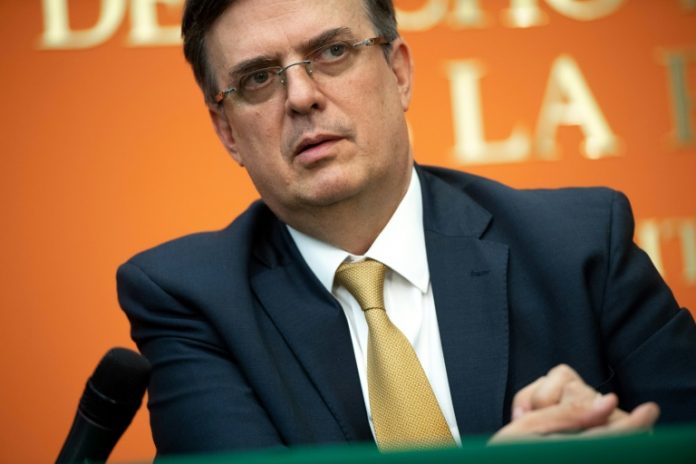President Donald Trump said insufficient progress was made Wednesday in talks with Mexico on averting the tariffs he threatens to impose unless America’s southern neighbor and key trading partner stems the flow of undocumented migrants into the US.
Trump’s evening tweet said that talks will resume Thursday, and came as new data showed migrant detentions at the southern US border have hit their highest level since 2006.
Ahead of the high-stakes negotiations Wednesday, the Trump administration laid out tough demands for Mexico City to crack down on hundreds of thousands of Central American migrants traversing the country to the US border in recent months.
Trump, tweeting from Europe, said “Progress is being made, but not nearly enough!”
He said that more talks will be held Thursday “with the understanding” that if no deal is reached, the tariffs he announced last week will go into effect Monday as planned.
That means they will start at five percent, hit all Mexican imports, and rise incrementally to 25 percent in October.
The tariffs could prove disastrous for Latin America’s second-largest economy.
Fitch downgraded Mexico’s credit rating Wednesday, saying its economy faced greater risk because of the threatened duties. Another ratings agency, Moody’s, changed its outlook for Mexico from stable to negative.
Ahead of Wednesday’s meeting, senior White House economic advisor Peter Navarro said Mexico would have to agree to lock down its own southern border and process migrant asylum claims inside their country.
Mexico recognizes that the situation on the border is untenable, Foreign Minister Marcelo Ebrard told a news conference after Wednesday’s negotiating session.
“Why? Because we saw the reports of the numbers and indeed, the flows are growing too much.”
“Measures must be taken not just in the immediate future, and not just punitive ones, for this to have a possible solution,” the minister said.
Ebrard, who leads the Mexican delegation which urgently travelled to Washington, earlier this week drew the line on so-called “safe third-country” asylum, signaling the discussions would be tough.
Speaking from Ireland ahead of the talks, however, Trump said he believed Mexico is ready to “make a deal.”

The talks opened as the US Customs and Border Protection agency reported that more than 144,000 migrants were detained or blocked from crossing into the United States from Mexico in May, a 32 percent surge from April and nearly triple the level of a year ago.
Most were families from Guatemala, Honduras and El Salvador. The total included almost 58,000 children, most hoping to escape chronic poverty and violence and get a foothold inside the United States.
CBP Acting Commissioner John Sanders said the numbers had overwhelmed government staff and facilities at the border.
Increasingly the migrants were arriving in large groups, including one of 1,036 individuals detained in El Paso, Texas on May 29.
US holding and processing facilities were full, and agencies involved were running out of funding.
The Office of Refugee Resettlement, which takes care of the thousands of unaccompanied children that cross the border each month, said Wednesday that it has had to cut back secondary services it provides them, including legal aid, education, and recreation.
“We are in a full-blown emergency. The system is broken,” Sanders said.
As the talks were underway, Mexico announced it had stopped a US-bound caravan and detained around 420 migrants.

The US administration has not said what degree of reduction in migration will satisfy it.
Mexico has deployed its new National Guard police force to its southern border and stepped up migrant detentions and deportations.
But the flow continues: the caravan that entered southern Mexico from Guatemala on Wednesday was initially estimated by state police to number some 1,200 people. Some may have fled after it was stopped, as only 420 were detained.
Navarro said than in addition to Mexico’s accepting asylum claims — rather than their being lodged in the United States — Mexico could avoid the tariffs by locking down its own border with Guatemala.
He also said that officials at checkpoints on the roads that migrants take through Mexico must stop taking bribes and permitting the migrants to continue on their northward journey.
“Those checkpoints are designed to stop the flood, but instead, it’s the corruption, the government officials that make money from this human trafficking, that has to stop,” he said.
“That’s it. That’s what we’re looking for.”
Separately, the Trump administration is under growing domestic pressure to drop the threat of tariffs. Republican legislators warned that curtailed trade would damage many US businesses which rely on goods and components made in Mexico.












